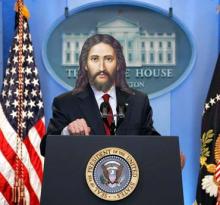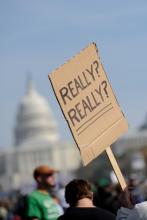Political Parties

The phenomenon of “creeping normality” allows for significant changes to be deemed acceptable when they occur gradually over time, in relatively unnoticed increments, rather than single steps or dramatic and noticeable instances. The “boiling frog” metaphor, which illustrates the familiar account of an unassuming amphibian that is slowly and successfully cooked to death, reveals not only how such instances can occur, but also how a calculated and protracted alteration (produced by those with power to turn up the heat) can possess disastrous results if not noticed and properly countered (by those left in the water). We need not look far for modern-day examples.
Extreme partisanship has crept into our political normality. As revealed last year by the Pew Research Center, our civic temperature is methodically rising, perhaps beyond the boiling point. The study states:
“The overall share of Americans who express consistently conservative or consistently liberal opinions has doubled over the past two decades from 10% to 21%. [As a result], the center has gotten smaller: 39% of Americans currently take a roughly equal number of liberal and conservative positions, down from 49% in surveys conducted in 1994 and 2004.”


We’d all love to claim Jesus for our team, but in doing so, we can safely assume that Jesus actually would wriggle free from such limitations. While it would be comforting to validate ourselves by claiming Jesus as a Baptist, Disciple, Catholic, or something else, what we’re effectively trying to do is keep from changing ourselves. We want to rest in the certainty that we’re all right how we already are, with no real need to grow or do things differently.

I was talking to my wife, Amy, today about the news that Speaker John Boehner has requested movement from his party toward a temporary increase of the United States government debt ceiling.
The shutdown in itself is problematic enough. Our leaders have willfully put about a million people out of work while they haggle about policy that has already been put into law. The cost of their standoff to the United States economy is a loss of about $1.6 billion a week in economic output. And it’s more than a little bit ironic that this is being done on the watch of a Congress that supposedly has its first priority as jobs and economic growth.
However, all of this pales in comparison to the potential damage that would ripple throughout the global economy if we were to default on our debt. Because so many markets in the world peg their valuation system to the American dollar, and because so many exchanges use our currency as their monetary system, the prospect of the credibility of our money losing its footing in a potentially irreparable way could be nothing short of catastrophic worldwide.
“We should just fire them all," said Amy. “Just clean house and start fresh.”
The thing is, although this is a sentiment I hear on nearly a daily basis, and I've heard it over the course of many years, very little of substance seems to change when it comes to who represents us in Washington, D.C.
It’s been a bad year, and the 2012 election year looks to be even worse.
Don’t get me wrong — there were many good and even wonderful things about 2011. I can point to weddings, great things in our family lives, wonderful moments with our children, acts of courage in our local and our global communities, and heroic accomplishments by people of faith and others of good will.
But when it comes to politics and to the media, 2011 was an abysmal year.
Washington is a dysfunctional place where we make the most important decisions about how our public resources should be allocated amidst artificial deadlines set entirely by ideological politics instead of the common good. Rational, thoughtful ideas for reducing the national deficit (while at the same time protecting our vital social safety nets and producing needed jobs) have been replaced by the politics of blame and fear.
And winning — at seemingly any cost — has trumped governing. To disagree with the opposition isn’t enough. Now politicians and pundits feel compelled to destroy their opponents’ character, integrity, patriotism, and even attack their faith.
People of faith -- including evangelical Christians -- will be voting both ways in the upcoming election. It is simply not true that they will be voting only on one or two issues.
And, if evangelicals focus on many of the issues central to their faith, rather than becoming partisan cheerleaders, they might be able to raise some critical issues in this election and to hold both sides more accountable, even in a campaign that both Richard and I suspect will be one of the ugliest in U.S. history.
At the end of the evening, Amy remarked that if the upcoming election debates were as civil and substantive as this evening was, we would all be very grateful.
Did anyone else get the feeling, as we watched weather reporters wave their arms frantically in swirling motions across oversized maps of the eastern seaboard -- with their eyes bulging as they pushed out whole paragraphs without a single breath for a period -- that this was all hype?
Last weekend, as Irene passed over town after town in the mid-Atlantic, memories of Katrina did not materialize. By the time Irene huffed over New York City on Sunday morning, and the flood of the century was actually just a really big puddle in Battery Park and a floating lifeguard stand in Long Beach, my fear had transformed into complacency. From there I became cynical. By Sunday afternoon I found myself watching the weatherman's bulging eyes as he repeated the mantra of the day: "It's not as bad as we thought it would be, but it's not over." And I thought: "Boy, they'll do anything for ratings."
But it wasn't all hype.